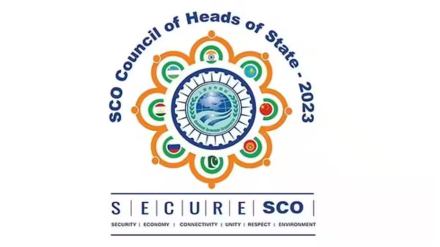The Shanghai Cooperation Organization’s (SCO) Council of Heads of State met via video conference on July 4 and adopted the “Delhi declaration”. New Delhi seeks to engage more closely with Eurasia, but the SCO’s stronger focus of late on connectivity, especially the China-led Belt and Road Initiative, is a sticking point. Here are the benefits and pitfalls of SCO for New Delhi
The SCO
The Shanghai Cooperation Organization (SCO) is an inter-governmental body formed in Shanghai, China on June 15, 2001, as an extension of the “Shanghai Five” constituted in 1996 by Beijing to address border security issues with four of its neighbours — Russia, Kazakhstan, Tajikistan and Kyrgyzstan. The sixth original SCO member is Uzbekistan.
In June 2017, India and Pakistan were inducted as full members. Iran joined as the 9th member on July 4, 2023, at the Delhi summit meeting via video. There are another 13 “dialogue partner” states including Turkey, Saudi Arabia, UAE, Egypt, Sri Lanka and Nepal, and a few with observer status, including Mongolia and Afghanistan, who have evinced interest to be full members.
Objectives
The Heads of State Council is SCO’s apex decision-making body, while the Heads of Government Council discusses strategies and approves annual budgets. The two permanent bodies are the Executive Committee of the Regional Anti-Terrorist Structure (RATS) and the SCO Secretariat.
The SCO charter came into force on September 19, 2003. It includes regional security issues as well as combating terrorism, ethnic separatism and religious extremism. It also aims to work for regional development and promote “effective cooperation in political, trade, economic, scientific, technical, and cultural spheres…” and in energy, education, transport, etc. Fostering creation of “democratic, fair and rational new international political and economic order” too is part of the charter. Members have held joint military exercises regularly, but the SCO hasn’t provided military support in any conflict thus far.
Delhi summit & declaration
Leaders (including Prime Minister Narendra Modi, Chinese President Xi Jinping, and Russian President Vladimir Putin), who met via video conference, recognised “the world is undergoing unprecedented transformations and is entering a new era of rapid technological development that requires an increase in the effectiveness of global institutions” like the WTO.
The Council of Heads of State also took note of multi-polarity, increased interconnectedness, interdependence and an accelerated pace of digitisation, but said “the threats and challenges are becoming more and more complex, destructive and dangerous, existing conflicts are aggravating and new conflicts are emerging.” Moreover, it rued the growing technological and digital divide, continued turbulence in global financial markets, global reduction in investment flows, instability of supply chains and increased protectionist measures.
India’s concerns
At the July 4 summit, PM Modi denounced China’s BRI, which runs into conflict with Delhi’s territorial claims over Gilgit-Baltistan and Pakistan Occupied Kashmir, and its say in the South Asian region. Modi stressed that connectivity projects must not pose a potential threat to sovereignty and territorial integrity of member states. While India has clearly negated the part of Delhi Declaration that endorsed BRI, and plans to link Eurasian Economic Union and BRI, it is unclear if the country is on the same page with other members on promoting local currencies for intra-SCO trade, given China’s ambitions on the yuan.
Modi also urged the SCO members to condemn cross-border terrorism, without naming Pakistan. Though SCO has reaffirmed in the latest summit too that, it “is not directed against other states and international organisations,” there is a perception of it as an anti-NATO grouping. Given India’s increasingly closer ties with the US, the reinforced Russia-China ties and Iran’s proximity to China, Teheran’s membership may increase New Delhi’s wariness about SCO. Iran being in the SCO, however, may stand India in good stead regarding its connectivity plans through the Chabahar port project, and the International North-South Transport Corridor.
